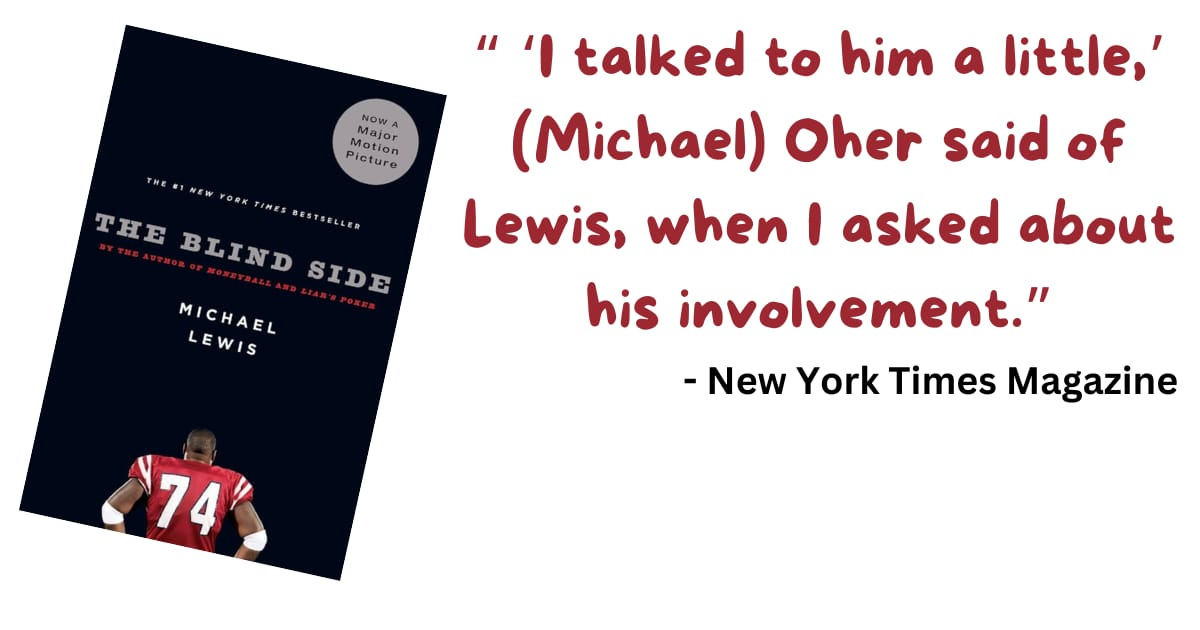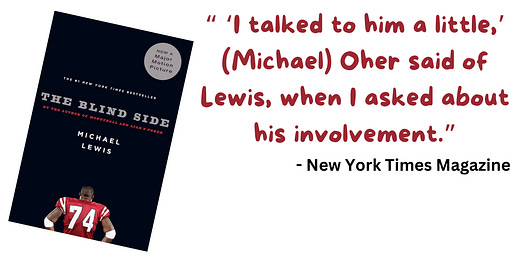Michael Lewis is kind of a dick
The author of "The Blind Side" is surprisingly ignorant about the book's subject.
Of all the different people in this story, I think Michael Lewis is the one whose shortcomings are easiest to quanitfy.

Some of that is because I’m a journalist, which means I’m familiar with the techniques and standards of writing contemporary non-fiction.
Some of that is because Lewis’s own words — both on the page and spoken aloud — reveal a transparent lack of regard for Oher’s capabilities both in his intellect and his understanding of the game of football.
In Michael Sokolove’s recent profile of Michael Oher in the New York Times Magazine, he points out that some passages of “The Blind Side” now “read as off-key”:
In characterizing Oher’s otherness at the wealthy and almost all-white Briarcrest school, Lewis describes him, variously, as “this huge Black kid” and “as lost as a Martian stumbling out of a crash landing.” His mother, Denise Oher, is “very large and very Black,” and in a brief meeting with her son Michael and Leigh Anne, she slurs her words and wears a “muumuu and a garish wig.” Sean Tuohy, who pitched in as an assistant football coach at Briarcrest, is credited by Lewis with a magical ability to instill confidence in teenage boys. He was said to reach out especially to the school’s few Black athletes. “I married a man who doesn’t know his own color,” he quotes Leigh Anne as saying.
After Oher learns that his father is dead — apparently having been thrown off a highway overpass — Leigh Anne tells him it might be for the best. “You didn’t know the man,” she says in Lewis’s book, and “one way or anotehr, you are going to have money, and you know that he would have found you and made claims upon you.”
New York Times Magazine, “The ‘Blind Side’ made him famous, but he has a different story to tell,” Aug. 18. 2024
Remember, Lewis and Sean Tuohy knew each other from childhood, having attended the same private school in New Orleans.
The fact that Leigh Anne is quoted to contextualize the death of Michael Oher’s father is pretty revealing about just how little Lewis took the young man’s feelings into consideration.
There’s one issue of fact-finding that is even more jarring. In the book, Lewis quotes Leigh Anne Tuohy as stating that Oher was staying with a family in a trailer when she insisted that Michael come and live in her family’s home.
Sokolove, the author of the New York Times Magazine piece, went with Oher to visit the home where Oher stayed prior to moving in with the Tuohys. It was not, in fact, a trailer. It was a pre-fabricated home with four bedrooms.
When Sokolove asked Lewis about this, Lewis said that the discrepancy should be taken up with Leigh Anne Tuohy.
Nah, man. That’s on Lewis. He’s the big, bad non-fiction writer who wrote about the investment bankers and baseball executives. Now he’s authoring a book that centers around a young Black man who was living in poverty, and he can’t be bothered to accurately detail where that young man lived before coming to stay with the Tuohys?
That brings us to the bigger issue: Oher is positioned as the main character in the book, but it’s fairly clear that Lewis wasn’t all that interested in understanding the experience from Oher’s perspective at all.
Oher was a high-school senior and college freshman while Lewis was researching the book, which was published in 2006. Here’s how Oher’s involvement with the book in the recent piece in New York Times Magazine:
“Oher told me that he did not understand at the time why someone was interested in his story or how he would fit into the book. ‘I talked to him a little,’ he said of Lewis, when I asked about his involvement.”
New York Times Magazine, “The ‘Blind Side’ made him famous, but he has a different story to tell,” Aug. 18. 2024
After book was published, Lewis spoke to a group at Google. This was on Sept. 11, 2007, and he was asked to provide an update on Oher, who was beginning his third year of college:
“He’s on the dean’s list at Ole Miss, which says a lot about the dean’s list at Ole Miss.”
Michael Lewis, September 11, 2007
This is an insanely dick-ish thing to say, but in my mind, that is not the most revealing element of Lewis’s answer. Lewis goes from talking about Oher specifically to speaking in this grand generality about the nature of academics in college sports:
“But you know what, in fairness to Michael, you know, Bear Bryant had that funny line, the former coach of the Alabama Crimson Tide, he once said to a reporter, we want to have a school that makes the football team proud or that the football team can be proud of.
“A lot of these schools sort of have inverted their purpose in life that there are schools like Ole Miss — but Ole Miss is not even the best example — that seem to exist mainly so that they can sustain a football team.
“And they take these kids — many of whom are from the underclass, poor Black kids from ghettos around America — and let them into the school, get them in however they can get them in, and then they create a track for them inside the school and the track is not designed for them to get an education or even to actually engage with the school outside of the football team in any way.
“It’s designed to keep their grade-point average to the level where they can continue to play football.”
Michael Lewis, September 11, 2007
He continues on from there, calling out Florida State as the prime example of this, but you get the gist.
Here’s why I think this is so telling: Lewis wrote a book in which Oher is positioned as the central figure and when he’s asked to provide an update on him, he can’t provide anything other than a throw-away joke about how college football doesn’t really value education.
It honestly makes me viscerally mad for two reasons:
As someone who worked for more than 20 years in sports media, I’ve come across way too many journalists who view the athletes they cover with this sort of contempt. It’s not just wrong, it’s inaccurate and it says way more about the person making the judgment that it does about the specific athletes who are being judged.
This author — whose book has hung over this young man’s career — doesn’t even know enough about him to provide any sort of meaningful update.
If Lewis really thinks Oher is stupid, I think that’s a nasty thing to say out loud, but he’s entitled to that opinion. However, I’m fairly certain that Lewis doesn’t know Oher well enough to even have an informed opinion about who he as anything other than a body playing football.
In all the time he spent researching and writing it he never bothered to learn where this kid was living before he came to live with his childhood friend and he didn’t keep track of what he did afterward other than to be vaguely aware that Oher had become part of Big Football.
After Oher filed his lawsuit in 2023, Lewis spoke to the Washington Post and said it was “breathtaking” that Oher could be distrustful of the Tuohys given everything they’d done.
In a profile of Lewis published in the Guardian, he went further:
“What we’re watching is a change of behaviour. This is what happens to football players who get hit in the head: they run into problems with violence and aggression.”
Michael Lewis as quoted in The Guardian
Lewis is fairly directly inferring that head injuries have compromised Oher’s cognitive ability. Essentially, Lewis saying that Oher must have brain damage to be suing Lewis’s childhood friend.
Lewis said he made this reference in anger when he spoke with Sokolove for the recent feature on Oher that appeared in the New York Times Magazine. Lewis said he regretted making the reference, but subsequently repeated it: “It should be part of the conversation about Michael Oher,” Lewis said, according to the story.
My only response to that is to wonder how Lewis would know what should be part of the conversation about Oher given how little he seemed to learn about the man.




